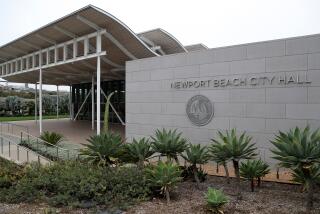Leisure World Officials Mount New Cityhood Effort
- Share via
LAGUNA HILLS — In another attempt to turn one of the nation’s largest retirement communities into a city, Leisure World officials have commissioned a $25,000 study to determine the costs and benefits of incorporation.
The study, to be completed by the end of the year or early next year, also will investigate whether cityhood would give the community more political muscle to deal with controversial issues such as the proposed commercial airport at the El Toro Marine Corps Air Station.
“City status would obviously give us more clout,” said Bob Ring, chairman of Leisure World’s 6,000-unit condominium association. “But [cityhood] would also have to be revenue neutral. We could wind up with more liabilities to pay for the services that a city provides.”
Although residents have made attempts at rallying the populace behind incorporation in the past, this is the first time that cityhood is being researched by the Golden Rain Foundation, the citizens group that runs Leisure World.
If the study’s results favor incorporation, the community’s governing body will ask residents if they want to become Orange County’s 32nd city.
“If they don’t want to become a city, that will be that,” Ring said. “It’s not the governance that matters, it’s the economics. We want to make sure we can pay for all the extra services we have to provide.”
The last serious attempt to incorporate Leisure World faded in 1992. Even though residents had their own study that showed incorporation would mean an extra $1 million a year in revenue for Leisure World, cityhood backers encountered resistance from the community and the issue never came to a vote.
As a city, Leisure World would be eligible for certain state revenue. It would also be responsible for paying for police and fire service.
Becoming a city will not be easy. Some Leisure World homeowners are totally against the idea of incorporation.
“I don’t think we need to be a city,” said Dan Burke, an eight-year resident. “Next thing you know, people want to be politicians, there’s elections--who needs all that stuff?”
*
Despite opposition from some residents, Leisure World officials said they called for the study to get a professional look at what it would cost to be a city.
“I know some people are horribly opposed to cityhood,” said Bert Hack, a former member of a Leisure World committee overseeing the study. “It will be a benefit to see what our options are . . . a lot of questions should be put to rest” by the report.
“The first thing people sometimes say around here is don’t do anything different,” he said. “But the world around us is changing; to do nothing is also a choice.”
Leisure World is a retirement community of 18,000 adjacent to Laguna Hills. Residents must be at least 55 years old and qualify financially to move into the community. If Leisure World were to become a city, Ring said, residents would still have to meet those requirements.
Many amenities provided by local governments like the city and county are already paid for by Leisure World residents.
*
Homeowners pay an average of $300 in monthly fees for many services provided specifically for retirees, such as buses to nearby shopping centers and medical buildings. Leisure World takes care of its own streets and hires a work force of about 1,000 to maintain the gated community.
The county supplies such services as fire and police protection, although Leisure World does have security personnel staffing gates and patrolling its 3.2 miles of homes, apartments and townhouses.
County government’s reaction to the bankruptcy declared in December 1994 started Leisure World officials thinking about incorporation, Hack said.
Before the bankruptcy, the county had taken a hard line against incorporation of cities and annexations and had prompted state legislation that reduced special tax benefits given to new cities.
The county’s stern stance against new cities was a reaction to the incorporation of five South County communities in a four-year period ending in 1991--a chain of events that cost the county millions of dollars in property tax revenue.
But after the financial debacle, county officials reevaluated their position and began encouraging unincorporated communities to become cities, which would take over the costly job of providing police protection and maintaining streets and parks.
“What do we gain, what do we lose, what are the benefits, that’s all we want to know,” Hack said. “The question is whether we can maintain our lifestyles by becoming a city.
More to Read
Sign up for Essential California
The most important California stories and recommendations in your inbox every morning.
You may occasionally receive promotional content from the Los Angeles Times.













